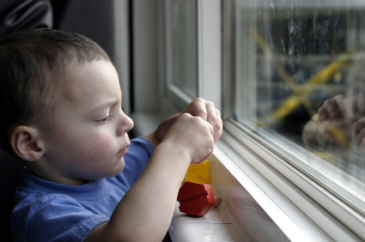The review of international studies of attachment, Baby Bonds, by Sophie Moullin (Princeton University), Professor Jane Waldfogel (Columbia University and the London School of Economics) and Dr Elizabeth Washbrook (University of Bristol), finds infants aged under three who do not form strong bonds with their mother or father are more likely to suffer from aggression, defiance and hyperactivity when they get older.
The Trust is urging the government to do more through health visitors and Children’s Centres, with their strong focus on improved outcomes for disadvantaged families, to support parents with babies and toddlers.
About 60 per cent of children develop strong parental bonds. The 40 per cent who lack such secure attachment are split into 25 per cent who avoid their parents when they are upset, because they ignore their needs, and 15 per cent who resist their parents because they cause them distress.
This is an issue for families from all social classes, but where families have multiple problems up to two-thirds of children have weak parental attachment. The report finds that boys’ behaviour is more affected than girls’ by early parenting.
The research finds that insecure attachment is associated with poorer language and behaviour before school. The effect continues into later life, with insecure children more likely to leave school without further education, employment or training. In one US study of disadvantaged children, the quality of parent care and attachment in the first years was a strong predictor of graduating from high school, alone predicting with 77 per cent accuracy whether children graduated or not. Neither IQ nor test scores improved upon this prediction.
The report also finds that securely attached children are more resilient to poverty, family instability, parental stress and depression. Boys growing up in poverty are two and a half times less likely to display behaviour problems at school if they formed secure attachments with parents in their early years.
Where mothers have weak bonds with their babies, research suggests their children are also more likely to be obese as they enter adolescence. Parents who were insecurely attached themselves, are living in poverty or with poor mental health, find it hardest to provide sensitive parenting and bond with their babies.
Today’s report explains how sensitive and responsive parenting in the first years of life is crucial to attachment. Simple, and often instinctive, actions such as holding a baby lovingly, and responding to their needs, are key to the development of attachment. Equally important might be acknowledging a baby’s unhappiness with facial expressions and then reassuring them with warm, happy smiles and soothing tones.
Conor Ryan, Director of Research at the Sutton Trust, said: “Better bonding between parents and babies could lead to more social mobility, as there is such a clear link to education, behaviour and future employment. The educational divide emerges early in life, with a 19 month school readiness gap between the most and least advantaged children by the age of five.
“This report clearly identifies the fundamental role secure attachment could have in narrowing that school readiness gap and improving children’s life chances. More support from health visitors, children’s centres and local authorities in helping parents improve how they bond with young children could play a role in narrowing the education gap.”
Dr Elizabeth Washbrook, Lecturer in the Graduate School of Education at the University of Bristol, said: "Children who are secure in their parents’ love and care feel surer of themselves. And, because they feel secure, they are better able to manage their feelings, behaviour, be resilient and relate to others. But mums and dads who face insecurity, economic or otherwise, will find it harder to provide the sensitive parenting needed for secure attachment."
The report Baby Bonds by Sophie Moullin, Professor Jane Waldfogel and Dr Elizabeth Washbrook is available on the Sutton Trust website.
